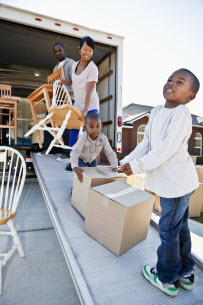Harris, Reed & Seiferth
|
 You did it! The key has been given, the contract has been signed and the first payment has been provided. Maybe you'll be staying in your new home for the rest of your life or maybe you'll be moving out in a few months – either way, it's an exciting time of life! Moving in can either be a great experience or a tough one, depending on how organized you are and the amount of enthusiasm your happy helpers have. Unpacking and preparing your new home may seem daunting right now, but once everything is said and done, you'll breathe such a sigh of relief. Take advantage of this moving in checklist to keep the process as smooth and enjoyable as possible! To see the other three blogs in this four-part series, click on any of the buttons below.  Inspect delivered boxes. Since you've already (hopefully) made your handy dandy household inventory sheet before moving everything out of your old residence, it should be easy to check each moving box against the detailed list as it's brought into your new home. If a box seems to be missing, inform the moving crew and see if it was accidentally left in the moving truck or was misplaced elsewhere. Once the movers are gone, inspect each of the moving boxes/personal items for damages obtained while in the hands of the moving company. If you find any items that have been broken or seemingly mistreated, write down the specific damage on your inventory sheet and contact the moving company to work through the issue together. Hopefully, if you've done your research and found reliable movers, the company will resolve the issue quickly. However, if they are not as trustworthy as they should be, you have the right to file a complaint against the moving company. Take pictures. Many rental properties charge a security deposit to new tenants in case damages are made throughout their stay. If you're moving into an apartment or rental home, snap a few pictures of the place right when you move in to document any damages made before your occupancy. Unfortunately, security deposit scams are fairly common, so be sure to protect yourself from the unnecessary charges later on. Check for cracked windows, nail holes in the wall, or anything of that sort which might condemn you later on. Your landlord is not able to withhold your security deposit for normal "wear and tear" like worn carpet, faded paint, or worn hardwood. Get utilities up and running. Hopefully you arranged the connection of the main house utilities before you moved, but if you didn't, do it as quickly as you can! Call your power and water providers to get things running smoothly before attempting everything else. Once the fundamentals are taken care of, contact your internet provider, trash/recycling remover and other important services to finish the job. Clean before unpacking. Before you start tackling all those boxes lying around, give your new home a good cleaning to get rid of any dirt or dust left from the builder or previous tenant. Someone has probably already come around with a duster and a rag, but it wouldn't hurt to wipe everything down one more time. Common places that are forgotten are the inside of kitchen cabinets, the trim on walls, light switches and door knobs. Unpack essentials. The Everest that is your giant inventory of boxes is not easily overcome, so taking it one step at a time is the best way to proceed. The bedroom and primary bathroom for each of your residents should be tackled first, followed by the kitchen and living room. Take the boxes labeled bedroom, bathroom, living room, kitchen, into each of the rooms so you can separate them properly before revealing their contents. If you've been following along well with this series, you should have packed a suitcase with essentials for the first few nights of your stay. Use those belongings to get you through the first few days instead of immediately unpacking your closet or the entirety of your bathroom supplies. Unpack everything else. You've already unpacked the essentials, but the rest of the house still needs some doing-up! I know it looks like a daunting task, but eventually all of those boxes will be gone and your new abode will look awesome. Recycle packing materials. Unpacking will leave you with quite the impressive amount of packing materials you probably no longer need. Ask friends or family if they have a need for any of the materials before recycling the rest. If you don’t want to get rid of them just yet, moving containers, bubble wrap and clean packing paper could also be a great way to store different belongings in a basement, garage or storage unit. Childproof home. If you've just moved in with a little one, make sure to childproof the areas where that child will spend most of his or her time – I'd begin in the nursery or living room. Secure the changing station, electrical outlets, and windows in the nursery as well as the bathrooms and stairs in the rest of the home. Nothing would be more stressful than moving into your new place and having your child stumble into an accident. Meet your neighbors. Perhaps one of the most important parts of enjoying the next however many years you stay – meet the neighbors! If you have awesome neighbors, they may have already stopped by and provided cookies or a hand in the unpacking process, but make sure you take the effort to go out and meet all of your closest neighbors. Recruit their help if you've moved into a new area you're not familiar with – what are the best restaurants, playgrounds, and grocery stores in the area? Congratulations on the move, and enjoy your new home! Source: https://www.foremost.com/learning-center/moving-in.asp
0 Comments
Leave a Reply. |
Categories
All
Archives
May 2024
|
Social MediaContact UsNavigation |
|
Website by InsuranceSplash
Privacy Policy | Terms of Use
© 2025 by HARRIS, REED & SEIFERTH INSURANCE GROUP, INC. All rights reserved.
© 2025 by HARRIS, REED & SEIFERTH INSURANCE GROUP, INC. All rights reserved.

 RSS Feed
RSS Feed